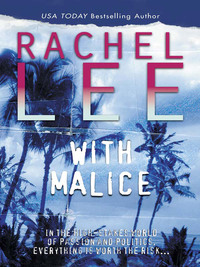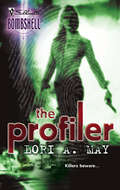Kitap dosya olarak indirilemez ancak uygulamamız üzerinden veya online olarak web sitemizden okunabilir.
Kitabı oku: «With Malice»
Detective Karen Sweeney recognized him the minute he climbed out of the cab in front of the crime scene.
Senator Grant Lawrence was sometimes referred to by the media as the next John Kennedy, and Lawrence really did have that magic. Karen, a lifelong Republican, somehow always found herself voting for Grant Lawrence, Democrat. He made sense.
She liked his attitude. And it didn’t hurt that he could give a younger Robert Redford a run for his money.
And that bundle of talent, looks and potentially huge problems was walking her way right now, being passed through the police cordon as if he were king. Nobody even asked him to wait.
This was Lawrence turf, even for the cops.
With Malice
Rachel Lee
WITH MALICE
Contents
Prologue
Chapter 1
Chapter 2
Chapter 3
Chapter 4
Chapter 5
Chapter 6
Chapter 7
Chapter 8
Chapter 9
Chapter 10
Chapter 11
Chapter 12
Chapter 13
Chapter 14
Chapter 15
Chapter 16
Chapter 17
Chapter 18
Chapter 19
Chapter 20
Chapter 21
Chapter 22
Chapter 23
Chapter 24
Chapter 25
Chapter 26
Chapter 27
Epilogue
Prologue
Abigail Reese was dreaming of passionate sex. She was not the woman in her dream, however. The woman in her dream was someone else, someone she knew, but whose face she could not quite place. The woman grunted and moaned, making sounds of mock resistance, her body bucking on something hard.
Then the dream shifted, in the way of dreams, and it was no longer passionate sex. It was no longer sex at all, and the woman was struggling, kicking, crying out in a weak, strangled voice. Abigail was paralyzed in her dream, unable to help the woman, nor even to open her eyes to see her face. The woman’s struggles grew more frantic and less controlled, panic and terror in the face of imminent death. Somehow gasping in a ragged breath, the woman’s voice screamed out her name.
“Abby!”
Abigail shuddered awake. For a moment she fought her body’s urge to drift back to sleep, knowing the nightmare would return. Her thin cotton nightgown clung to her damp skin like a shroud. She threw the covers off as the woman tried to call her name again.
“Ab—”
The sound died away in a gurgle.
It was not a dream.
Had she been fully awake, Abigail might have done the smart thing. She would have remembered that the children were with their father this weekend, locked her door and dialed 9-1-1. But in the manner of a woman who had cared for children for sixty of her seventy-five years, her first thoughts were not for self-protection. Adrenaline surged into her system, and she bolted out of bed with a fluid strength that would have surprised someone who looked upon her wiry, slightly bowed frame.
The horrible sounds continued, not at all passion but stark terror, and she grabbed for the first thing she could find, a heavy glass ashtray, the last remnant of a long-dead habit, before opening the door and moving toward the screams that were growing fainter by the moment.
Bile rose in her throat as she came to the bottom of the stairs and rounded the corner into the living room. The sounds from the woman reached a new if almost silent intensity, the nylon stocking—nearly invisible in the flesh of her neck—choking off all sound. But her eyes…
Abigail had seen a lot in her three score and fifteen years of life. She had watched a young boy scream as the doctors tried to reset the shattered bones in his lower leg, ending his dreams of college football. She had seen the boy grow into a man and the pallor in his face as he asked her whether he should propose to the woman he loved. She had watched him nearly faint at the news that his new wife was pregnant, and beam at the birth of their first child. She had watched his face, his entire countenance, sink like a gutted ship when he heard that his wife had been killed. She had seen children quiver in fear of punishment, in fear of shots, in fear of first haircuts. But she had never seen eyes like this.
They bulged from the sockets, blotched with red from burst capillaries, and they were looking into the face of eternity. The bloodied lips beneath them mouthed a word: “Abby.”
It was only then that Abigail noticed that the woman was naked, her shredded nightgown protruding from beneath her back, apparently wrapped around her wrists. Her legs, though free, made only futile kicks, easily resisted by the man who was bent over her breast. With an ugly, wet, ripping sound, his face rose from her chest. He spat, and a chunk of flesh landed on the woman’s face. Then he seemed to see through her eyes and turn to Abigail.
His was the face of a monster, smeared with the woman’s blood, white teeth and eyes glistening in a red mask of rage and fury.
Abigail’s nostrils flared with the fight or flight response. She should have flown. Instead she charged him, the ashtray raised high in her hand, the lioness protecting her pride. She closed the distance between them in four steps, swinging the ashtray down at his head with all her still considerable strength. But she was an old lioness, and her reflexes were not those of the younger woman who had snatched children from the throes of danger for decade upon decade.
He turned and caught the blow on his shoulder, grunting in pain, and then his arm flashed up. It was only then, in that last instant, that she saw the gleaming blade in his gloved hand, in the last instant before it plunged into her throat and savagely ripped across.
For a moment she thought he had missed, for there was no pain. But then she saw the pulsing explosion of red splash over his face, and in the fast-dimming light she realized it was her own blood.
She dimly heard a voice. “I’ll get him, too!”
Abigail Reese was once again dreaming, running through a tunnel, trying to escape the gurgling, wet sound that propelled her. The light at the tunnel seemed to dim, then exploded into brightness and swallowed her.
1
Senator Grant Lawrence grunted in disgust as he paged through the proposed amendments to Senate Resolution Fifty-Two. Whenever he thought about the bill he’d sponsored, he forced himself to think: clams have lips.
That reminded him of the first time he’d snorkeled in the Florida Keys, as a teenager, and had seen the beautiful coral through water so crystal-clear that he’d felt he could see forever. On that bright April day, during Easter vacation, he’d been gliding through the water when he’d seen a squiggly, bright red line in the sand beneath him. He’d reached down toward it, and the line had split down the middle, the clam opening its shell to test the disturbances around it. Apparently deciding his finger was not appetizing, it had closed its shell again, leaving only that squiggly, bright red line.
Clams have lips. And, Grant had decided, they wore lipstick.
He forced himself to remember that day because he could not repeat it. The water of the upper Keys was now cloudy and thick with sea grass, choking out the coral, hiding or chasing away the clams. The grass was the product of nitrogen in the water, the runoff from fertilizers used by sugar growers in the Everglades. The problem was not limited to his native state, of course. All along the eastern seaboard and Gulf Coast, nitrogen-laden runoff was feeding sea grasses that had replaced the native underwater flora and displaced fisheries.
S.R. 52 was an attempt—a feeble attempt, his critics said—to slow the damage. It wasn’t perfect, but it was based on the best scientific evidence and advice his staff could assemble. And it would be reasonably cost-effective to implement. Many of his colleagues in the Senate agreed, and his staff had negotiated with, cajoled and arm-twisted enough of the others that the bill seemed likely to pass.
Thus, he was not surprised by the pork amendments that had grown like barnacles on the hull of an ocean liner. Most were only vaguely related to the bill itself but would instead funnel some money into authors’ home states. Some of them were amendments he’d pledged to support, bartered in order to secure a colleague’s vote on the primary bill. However distasteful it might seem, it was the way of politics, and he accepted it as a necessary and sometimes beneficial fact of life.
Others were not so benign.
Amendment Nineteen, for example, would strike the paragraph that authorized additional funds to the EPA to monitor and enforce S.R. 52. Creating unenforceable law was an old political trick. The idea was to allow law-makers to pad campaign literature about how they’d voted on popular issues without sacrificing campaign contributors whose interests ran the other way. To the voters: I voted to protect your environment. To the contributors: But I knew this bill wouldn’t upset your apple carts.
And he knew who was behind that amendment. Randall Youngblood, head of the cane growers’ association, now lobbying for a loose coalition of agriculture associations nationwide. Randall Youngblood, old friend, now nemesis.
Clams have lips. Grant used that image to maintain his focus as he waded through the swamp of cynical motives and opaque language. He scrawled NO!!! through the text of A.19, then tossed the folder aside. He would slog through the rest of it later.
He took another minute to flip through the news digest, circulated to members of Congress by e-mail. Compiled daily from wire services and newspapers from around the world, it offered a quick précis of the day’s events. A humanitarian relief convoy had been ambushed by guerillas in Colombia, the second such ambush in a week. Two Americans were among the thirty-one casualties.
Grant scanned the rest of his e-mail. The only one that mattered was the notice of a meeting of the Central and South American Affairs Subcommittee of the Senate Armed Services Committee. The meeting was set for 10:00 a.m. He had no doubt that the situation in Colombia would be first on the agenda. He logged off and shut down. Colombia would have to wait. It was two in the morning, and he’d promised to take his daughters to breakfast.
While he loved having the girls in D.C. with him when they were off from school, they did make for longer days. Still, burning the midnight oil was a small price to pay for the time he had with them. He switched off the desk lamp and took a few moments in the comfortable darkness to massage the hair at his temples.
At least in the darkness he didn’t have to notice that his formerly raven black hair was turning gunmetal gray. His advisors had turned to an image consultant, who had pronounced it “statesmanlike” and “dignified.” Grant thought it simply made him look old. But within a week the advisors had tromped in with focus group research. His daily jog, trips to the Senate gym and a healthful diet had kept him trim and lean. The focus group felt that the gray streaks softened his otherwise chiseled, youthful face. “The energy of youth, tempered with the wisdom of experience,” one woman had said.
That sounded much grander than he felt about himself. He’d spent the day in the company of the energy of youth, chasing his girls around the Smithsonian. They had speed-walked him into the ground, giggling when he’d begged them to “slow down for the old man.” Energy of youth? Not.
Letting out a sigh, he rose from his chair just as the phone rang. It was his private line, and the caller ID display flashed the name.
“What’s up, Jerry?”
Jerry Connally’s voice was thick with tension. “Grant…shit, I don’t even know how to say this. It’s Abby. She’s…dead.”
“Oh no.” Grant felt the bottom fall out of his stomach and sagged back into his chair. “Oh no.”
“She was…murdered.”
Abby? Murdered? Shock froze him, caught him in an endless instant of incomprehension and disbelief. He had known the day would come when her body failed her, but this…this was beyond imagination. “Oh God. Oh God. This isn’t…it couldn’t have…”
Jerry’s voice softened. “I’m sorry, Grant. I am so, so sorry.”
Abby had been his nanny, raising him practically single-handedly while his parents had rubbed shoulders with the wealthy and powerful. It was Abby who’d taught him the difference between glitter and gold, that the wealthy were not always worthy of the privilege they enjoyed. And when his wife had died, it was Abby who’d stepped in to raise his girls. It was simply not possible that she was gone.
He had to lean forward, to put his head between his knees as he clung to the phone. The world around him swirled, and there was a faint buzzing in his ears. “Where? How?”
“She was here at home, Grant. Stabbed.”
No. It was not possible. His mind rebelled, even as the words came out on autopilot. “A burglary?”
“I don’t know,” Jerry said. “It gets worse.”
“Worse?” Grant asked. He gripped the phone so tight that his fingers ached, but that pain was a distant thing, barely scratching the surface of his horror.
Jerry paused for a moment. “They killed Stacy, too. It was…it was really ugly.”
The room spun in the darkness, shadowy images swirling, closing in on him. Grant reached out, turned on his desk lamp to hold them at bay. He had to lift his head to do it, and the room spun a little once again. The light seemed to pierce his eyes. “What was Stacy doing there?”
“Don’t worry about it. I…took care of it.”
“What? How?” He wouldn’t have thought his horror could have grown any deeper, but it did.
Jerry’s voice grew chilly. “Senator, you don’t want to know.”
Karen Sweeney looked at the body in the alley again, then looked away. “God, what a mess.”
Corporal Terry Ewing nodded in agreement, his face ashen. “Someone was really pissed at this woman.”
“Looks that way,” Karen said. She tore her focus from the horror in front of her and found a procedural routine. “Okay, Corporal, start logging the scene. ID anyone who’s been in this alley, starting with whoever found the body. Seal the scene. Nobody comes in except the M.E.”
“Should I call for the P.I.O.?” he asked.
She shrugged. “You can try, but he’s already up to his ears in College Hill.”
It would be better if the public information officer handled the press. But that wasn’t going to happen here tonight, not with a black woman and her two children gunned down in a drive-by. The College Hill project had convulsed under escalating street gang violence, the ironic and tragic aftermath of a major drug bust that had left the formerly dominant Dark Angels decimated and leaderless. Three other gangs had flooded into the void, warring over control of the lucrative turf, where ecstasy, crystal meth, crank and smack flowed like deadly, golden water in neighborhoods where hope was dim and life was cheap. The P.I.O. would be there, trying to sound cool and authoritative as he dispensed what little meaning could be found in such mayhem. Detective Karen Sweeney was on her own.
She sighed and looked at the patrolman. “Who’s your backup, and where is he?”
He nodded toward the end of the alley. “Patrolman Stan Barnes. Fresh out of the academy and he walked into this. He’s in the car.” Ewing pointed at a pale yellow puddle splashed down a wall opposite the body. “He lost it.”
Karen looked at the stain on Ewing’s cuff and realized he’d been standing with the other cop when it happened. Unlike the horror that had been visited upon the woman at her feet, Karen could see that scene clearly. Ewing standing there, patting the young cop’s shoulder, offering whatever supportive words there were, while the man lost both his dinner and his pride. “Tell him it’s okay. It happens to most of us the first time or two.”
“I did,” Ewing said simply.
Karen nodded. “Okay. You’re logging. Tell…Barnes, is it? Tell Barnes we’ll use his cruiser as a command post until downtown gets us a crime scene van. I’ll be out to brief the press when I know something. In the meantime, all he knows is that we’ve found the body of a young, white female, and the investigation is ongoing.”
“The usual spiel,” Ewing said. “It’ll give him something to do. Good idea, Detective.”
“Thanks.” He nodded, jotted her name and badge number on a clipboard, and strode to the end of the alley.
Karen unslung the bag on her shoulder and set it atop the lid of a crusty Rubbermaid trash can a few yards down from the body. She pulled out a dozen of what looked like dinner place cards and numbered each with a black magic marker. She then stooped and put the card numbered “1” on the yellow stain and spoke into a microcassette recorder.
“Item one, yellow-brown stain at base of north wall, opposite victim, vomit of Patrolman Stan Barnes.”
She continued in a slow, methodical pattern, first working her way to the end of the alley along the north edge, marking and noting an oil stain, two sodden and faded cigarette butts, and a half-dozen other bits of debris, all of them probably meaningless. Once at the head of the alley, she pulled out a fat yellow piece of chalk, drew an arrow pointing back into the alley and crouch-walked her way back to her evidence bag, dragging the chalk on the concrete in a wavy, sometimes broken, but clearly visible line. This demarked the “safe” path into the alley, so the medical examiner and any other officers who responded could get to the body without disturbing evidence.
With that first task completed, she had banished the horror from her mind, at least temporarily. Now she could turn her attention to the body and its immediate environs with cool, professional detachment. She lifted the recorder to her lips as her eyes swept the scene.
“Victim is a white female, apparently early-to mid-twenties. Bruising and diffuse ligature marks on wrists indicate that the hands were bound at some point, although no matching material is immediately visible at the scene. Nylon stocking tied around the victim’s neck, along with pitecchia in the eyes and teeth indicate strangulation as the probable cause of death. Missing tissue on breasts, lower abdomen and upper thighs, with torn edges. Probably bitten away. Extensive bloodstains on skin and partial clotting indicate this was probably pre-mortem.”
Forcing herself to take a mental step backward, she took in the overall impression of the victim. No prostitute, she decided. This woman looked too well-conditioned for that, and in no way blowsy. That helped, because it was likely she would be reported missing before too long.
She turned away again as humanity pushed aside objectivity, took a slow, deep breath, and forced herself to continue. She looked again, clinically. Something was wrong. “Lividity is noticeably uneven, greater on the left shoulder, arm, hip, outer thigh and calf, although victim was found on her back. Victim may have been…”
Switching off the recorder, she called to the end of the alley. “Ewing. C’mere a minute.”
The patrolman approached along the path she had marked. “What’s up, Detective?”
“I think the body was moved. Have Barnes clear the street around the end of the alley and photograph any tire tracks. Make sure he shoots my car, yours and his for negative comparison.” She looked up at the overcast sky. The Florida air was thick with humidity. “And tell him to hurry it up. It looks like it’s going to rain soon.”
Ewing nodded. “Yes, ma’am.”
Karen then returned to her bag, tore off a long strip of waxy paper towel and laid it over the left side of the body, weighting it at each end with spare boxes of film. She carefully pulled the paper back a bit and studied the ruddy skin of the woman’s left hip and shoulder. The dimples were faint but visible, fading down the arm and thigh. Atop the woman’s thighs, Karen saw faint blood smears that mirrored those on her abdomen. She switched the recorder on.
“Remind the M.E. to check for carpet fibers. Victim was probably transported to the scene in a fetal position, on her left side. Probably in the trunk of a car.”
Two hours later, Karen watched as the M.E. techs zipped up the black vinyl body bag and hefted it onto a stretcher. The crime scene techs had arrived a half hour ago, and she had long since determined that the homeless woman who’d stumbled over the body was too disconnected from reality to offer any useful information. There was little left for her to do, and she walked back to her Jeep Wrangler, took a long swig from a lukewarm bottle of water, and began to scan Ewing’s and Barnes’ initial reports for anything they might have caught that she had missed.
She was still reading when her cell phone rang. It was the familiar voice of Sergeant Laura Aranchez, the overnight dispatcher for robbery-homicide.
“You’re going to hate me, Karen.”
“Don’t even go there, Aranchez.”
Karen heard the sigh and knew what was coming before the woman spoke.
“Afraid so, Detective. Black female, Tampa Palms.” Aranchez read off the address.
Karen fought down the anger. Yes, College Hill was important, but so was the single white female, mid-to late-twenties, whose mutilated body lay ten yards away in an alley. “I’m still working this scene, Aranchez. Can’t they free up someone from the gang-banger?”
“The lieutenant says you’re it,” Aranchez answered. “And he wants you there an hour ago.” There was a pause. “That address is Senator Lawrence’s house.”
Well, shit, Karen thought. That explains a lot. “I’m on my way.”
It was going to be a long night.
Karen surveyed the bustle of activity with more than a bit of disgust. It had taken her ten minutes to reach the Tampa Palms address, and the crime scene techs were already unloading their van as she pulled in. Death might be the great equalizer, but the rank of the living still held sway in the passage of the dead.
A middle-aged man in blue suit pants and a white dress shirt intercepted her on the way to the door and extended his hand. “Jerry Connally,” he said, as if the name ought to mean something.
She shook his hand briefly and stepped aside. “Detective Sweeney, TPD. If you’ll excuse me.”
He didn’t step into her path, didn’t move at all, yet his posture said I’m not finished with you yet. She met his eyes. “What is it you need, Mr. Connally?”
“I’m special counsel to Senator Lawrence.” He nodded over his shoulder. “You’re aware this is his home.”
Oh God, she thought. So it’s starting already.
“Yes, I am. It’s also a crime scene, and I’m the lead detective. And I’ve just been yanked off another homicide scene because they wanted me here in a hurry. So again, if you’ll excuse me…”
He moved aside, as if to give her entry, but his posture was such that she paused and looked at him again. He reminded her somehow of a broody hen protecting a chick. It was as if he wanted to tower over her, tower over everyone and everything to protect his charge. She wondered if Senator Lawrence liked that…or if he was even aware of it. But something clicked in her mind, making a note she was hardly aware of.
Then she dismissed him with a glance and brushed past him into the foyer.
These were the houses of the rich, out here, and space was generous. The foyer was large, tiled in green marble that framed the sweeping rise of a staircase. The activity she was interested in, however, was in a room off to the right. She could see the criminalists poring over the scene like a hive of ants with a fresh kill. The kill lay on the floor, covered by a sheet. Arterial spray across one wall and the sofa, along with the huge puddle on the floor around the covered corpse, told a great deal of the story.
The room itself was very much not Florida. It might have been taken from the home of British nobility of the eighteenth or nineteenth century, except that it was dominated by cream and ecru. Cream everywhere. And blood. As least half the blood that filled an average human body. Red on cream. Screaming.
With the criminalists all over everything, there wasn’t much she could do except ask to see the body and find out what they knew so far. She raised an eyebrow in the direction of Millie Freidman, the lead technician on the scene. Millie nodded, spoke a few words to one of her team members, and came over to her, taking care to stay within the taped-out pathway.
“What have we got?” Karen asked.
“Ugly. Very ugly. The senator’s seventy-five-year-old nanny had her throat slashed.”
Karen winced. Violence against the elderly always seemed so inexcusable. How much more harmless could a human being be?
“Yeah,” said Millie, reacting to Karen’s expression.
“Robbery?”
“It doesn’t look like anything else was disturbed. I have some people checking the rest of the house, though.”
“Any other wounds on the body?”
“None that I can find.”
Karen nodded, feeling like a fifth wheel. “Who found the body?”
Millie showed her teeth in an unpleasant smile. “The senator’s watchdog.”
“Connally?”
“You got it.”
Karen glanced at her watch. “This early in the morning?” She hated the very idea, but it appeared she was going to have to go talk to Jerry Connally.
One of the many reasons she was getting bone weary of this damn job.
He was careful not to show it, but Jerry Connally was as nervous as he’d ever been in his life. He was a man totally in control of himself and most of the world around him, but at this moment he felt his control might be slipping.
In law school he’d taken an advanced prosecution clinic. The professor had told him something he’d never forgotten. Criminals don’t get caught because cops are brilliant. Criminals get caught because they’re stupid. For every one thing they think of, the professor had said, they forget five others. And those five others bury them.
Jerry had tried to think of as many things as he could in moving Stacy’s body. And he thought of himself as a smart guy. But that only meant that for every one thing he’d thought of, he’d probably forgotten two or three or four others.
The bottom line, though, was that Grant Lawrence was worth the risk. And if Jerry’s neck ended up in the noose to save Grant’s…that was just how things would have to be. Grant deserved no less.
He waited in the foyer for a few moments, glancing in the large, ornate mirror near the door to make sure he looked like himself and not like some criminal with something to hide.
His open, Irish face looked back at him, unnaturally somber but otherwise normal. A little edginess, he assured himself, was okay under the circumstances. After all, he’d discovered a brutal murder. So it didn’t matter that his tie was loose or his remaining hair disheveled. It fit the moment.
Then, shoving his hands in his pockets to still their sudden inclination to fidget, he stepped back outside. He didn’t want to hear what the crime scene people were telling that detective. What was her name? Swanson, Swenson, something. Sweeney, that was it. Someone he had a feeling he wasn’t going to be able to control all that easily. He might have to do something about that.
Just then she appeared at his side. Damn, he hadn’t been paying attention. He offered a smile.
“What can I do for you, Detective?”
She regarded him with gray eyes that seemed devoid of any color whatever, save for the tiniest slivers of green around the pupils. Predatory eyes.
“I understand you found the body?”
He nodded.
“It’s, what, 3:00 a.m.? What were you doing here?”
This part was easy. It was the truth. “The senator left a message for me last evening. I was out with my wife at the time. He needed some papers faxed up to his office, for a bill that’s pending. We got home around 1:00 a.m. I got the message and came right over.”
“Couldn’t it have waited till morning?” she asked.
“Yes. It could have. But I was planning to take my kids fishing today. I wanted to wrap it up tonight so I’d have the day to myself.” He sighed. “Best laid plans.”
The woman seemed to look right through him. “I’m sure Abigail Reese didn’t plan on getting killed, either.”
It was at best a sarcastic remark, and he could have argued the point. But for the moment, at least, she held the power. Better to let that lie, wait for her to realize she’d stepped out of line, and be ready to take advantage when she apologized.
“Point taken, Detective.”
But she didn’t apologize. She didn’t even seem to care that she might have crossed a line. Dangerous woman. She continued looking right through him and asked, “Weren’t you afraid that coming into the house this late at night would wake the nanny?”
He shook his head, fists clenching inside his pockets. “Abby didn’t have the best hearing. She wasn’t stone deaf or anything, but I’ve come and gone before while she was sleeping.”
“And you have a key, and you know the alarm code.”
“Yes, exactly for purposes like this. The senator has an office at the back of the house.”
She didn’t say anything but simply turned to look at the brass dead bolt. Damn! He hadn’t thought of that. There was no evidence of tampering. Shit!
She turned to him again. “Was the alarm on when you got here?”
He thought rapidly, then decided the truth was best on this one. “No.”
“Did you find that odd?”
“Not necessarily. Abby sometimes forgets about it.” That, too, was true. Grant had complained about it once, because he was concerned that she forgot it when his children were home.
“And you know that how?”
“Because the senator complained to me about it once.”
She nodded, for the moment giving him the feeling she was accepting his explanations. “How did you enter?”
“Through the front door. As I always do.”









